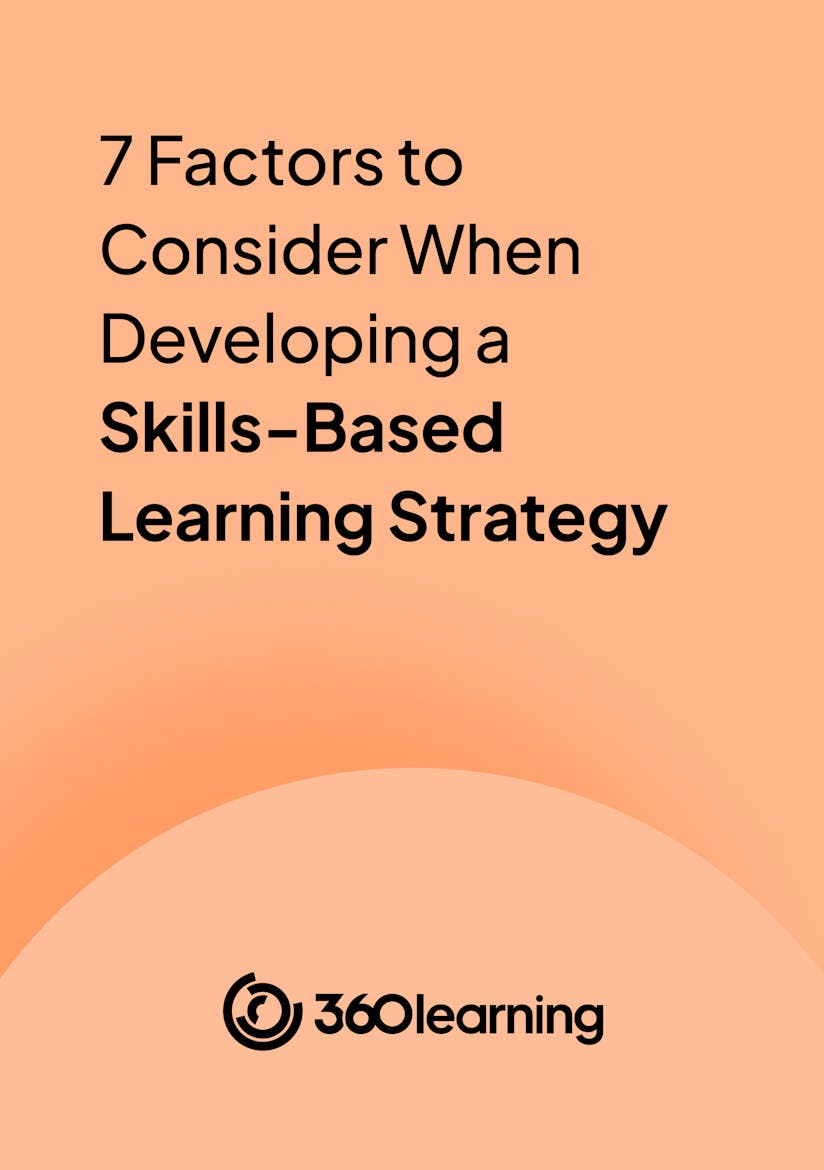
Discover the learning platform powered by collaborative learning.
A 15-minute discussion with an expert
100% tailored to your needs - with ❤️
No commitment. Free as can be.
Developing, assessing, and managing skills in any organization is critical. They’re an important business asset, just like your customer portfolio or the cash in your accounts.
Skills churn just like customers, and can dry up faster than funding. That’s why actively defining, tracking, and developing skills should be a core part of any workforce strategy.
Technical skills are often the most visible and measurable, making them easier to assess, hire for, and develop internally. And when they’re lacking, the impact is immediate: slower product delivery, knowledge gaps, and missed growth opportunities.
In this article, we’ll break down what technical skills are, share real-world examples, and explore how companies can effectively define, manage, and build these capabilities to support long-term performance and agility.

By providing your contact info, you agree to receive communications from 360Learning. You can opt-out at any time. For details, refer to our Privacy Policy.
Technical skills, also called “know-how” or “hard skills,” are the specialized competencies and knowledge that let individuals perform their roles. Already acquired or to be learned, they are an integral part of measuring performance and defining talent in a company.
While more pronounced and specific in some fields, every role includes a mix of technical and soft skills. Being able to measure these and test for them during hiring is critical.
Equally, many technical skills will be proprietary, and must be learned once in a specific role. You must be able to identify these and provide regular, high-level training.
Broadly speaking, technical skill sets can include:
Technical skills are most often presented in contrast with soft skills. Soft skills are the general traits or characteristics a person displays that make them more or less suited to specific roles or tasks. Examples often include leadership, communication, and empathy.
Both hard and soft skills can be learned and trained. But it’s seen as easier to measure and assess technical skills objectively, and to hire people on this basis.
Knowing how to determine the technical skills suited to the different professions in your company is crucial in order to then be able to evaluate them against a performance grid.
Skills assessments are essential to:
To achieve the above, you need to be able to build an effective skills map highlighting the range of skills your company needs. This must include the technical skills specific to each role, and broader skills applicable to all roles at differing levels of attainment.
Build a technical skills profile by business function by precisely identifying the role of the function and the skills attached to it.
This work will necessarily require time and human investment. And it needs to be updated regularly, particularly as technology and the demands of each role evolve.
The specific technical skills required to perform in a certain role obviously depend highly on the role. And team members need to implement this knowledge in a particular context and use a certain number of tools depending on the profession.
Here are some examples of technical skills for key roles in many companies.
Key technical abilities for software development and information technology professionals include:
All of the above will then depend on the role itself, and the languages and systems used in the company. An iOS developer clearly needs an expert degree of proficiency in the iOS operating system, but may also benefit from a base level understanding of Android and other mobile phone systems.
And under programming languages, they will likely need to know Swift and potentially Objective-C, which isn’t the case for most desktop application developers.
Because salespeople are typically seen as relational experts, we might think that most of their required skills are soft. But there are some key technical skills that must be learned either through experience or dedicated sales enablement training.
Technical sales skills include:
Product knowledge is clearly a top priority, and is almost entirely a proprietary skill. And while there may be softer, relational aspects to negotiation and cold calls, there are technical steps and strategy to master as well.
Many marketers are hired for relevant technical skills in key areas like paid social advertising or email marketing. On the other hand, the popular notion of the “t-shaped marketer” suggests it’s best to find broadly competent team members who can contribute across the board.
Whether you’re hiring for technical marketing skills or developing them in house, here are some to watch for:
There are plenty more, of course, but these show up on the majority of marketing job descriptions.
Similar to sales, managers need strong relationship skills to succeed. These aren’t necessarily hard skills.
But some of the technical skills to look for in good managers include:
Again, these are factors you can specifically list in a job description and test for in interviews. And some will be company-specific, learned in this precise role.
And for hiring managers specifically, we can add specific software applications for recruiters, database management, and tools that help survey the job market.
As detailed in our Global State of Upskilling and Reskilling Report, skills gaps are a real issue in organizations. And there are four chief reasons why these gaps emerge:
The result is fewer team members with the required skills, work experience and expertise in your organization.
Keeping technical skills up to date is crucial for a business. You must identify skills gaps as early and often as possible.
But many companies rely with scattered frameworks and outdated skills maps to keep track. And even where they can identify gaps, closing them is another story.
In our view, there are five crucial steps to identify and update all skills, including technical ones:
We’ll leave it there, as we’ve gone into each of these points in detail previously–read more on upskilling and reskilling talent.
Here are a few of the most common questions people ask about technical skills.
There’s a long list, and many are highly industry-specific. But the following technical skills are particularly sought-after and relevant in 2025:
This will always be context dependant—a Java dev for an API team might need different skills than one building internal tools. But good skills assessments will include:
Soft skills are typically seen as the opposite of hard or technical skills. These are more behavioral or interpersonal capabilities that complement the hard skills a person needs in their role.
Both are important, and neither is necessarily more valuable than the other. But technical skills tend to make a person the right fit for specific tasks, while soft skills help them function well in any position or company.
Soft skills may include: problem-solving, decision-making, teamwork, communication, time management, and plenty more.
Every company takes their own approach to hiring. And in some industries, like healthcare, aerospace engineering, or financial services, there’s simply no way to perform certain roles without the requisite hard skills.
But relying purely on a job seeker’s certifications or the skills section of their CV can be limiting. The best companies have strategies to reskill and upskill employees on the job, and bridge key gaps without an over-reliance on hiring.
So while hard skills can be a good starting point, employees are never finished products when they join a company.
At 360Learning, we bring training strategy and skills management together. Our skills-based tools help you easily identify and close the gaps holding back company growth. Every individual can track their progress against their own goals, and you can also monitor overall performance at the company level.
For L&D professionals, this helps prove your impact: you have the data necessary to support strategy, obtain the budgets you need, and receive recognition from management.
Most importantly, our built-in AI tools let you do more, faster. Whether you’re identifying skills gaps, building reports, or designing whole new courses and assessments, it’s never been this efficient or effective.
We believe that skills-based learning is the best way for L&D and their organizations to succeed in the face of constant change. Learn more about how Skills by 360Learning can help you make this transition successfully.
A 15-minute discussion with an expert
100% tailored to your needs - with ❤️
No commitment. Free as can be.
By providing your contact info, you agree to receive communications from 360Learning. You can opt-out at any time. For details, refer to our Privacy Policy.